Top Alternatives to ngrok in 2025 for Secure Tunneling
 Sohaib Ilyas
Sohaib IlyasTable of contents
- Beyond ngrok: Exploring the Best Tunneling Options for Developers
- 1. Localtunnel
- 2. Serveo
- 3. Pagekite
- 4. Cloudflare Tunnel
- 5. Tailscale
- 6. Localtonet
- 7. Pinggy
- 8. frp (Fast Reverse Proxy)
- 9. Loophole
- 10. Zrok
- 11. Packetriot
- 12. Inlets
- Key Features Comparison of 12 Ngrok Alternatives
- Choosing the Right ngrok Alternative for Your Needs

Beyond ngrok: Exploring the Best Tunneling Options for Developers
Need to expose a local development server to the internet? Ngrok is a common solution, but it's not the only one - and might not be the best one for your needs. This guide explores twelve powerful ngrok alternatives, providing practical insights gleaned from real-world use. We'll cover everything from setting up secure tunnels to handling complex configurations, going beyond simple feature lists to offer detailed comparisons and honest assessments.
This detailed comparison covers the following alternatives to ngrok:
Localtunnel
Serveo
Pagekite
Cloudflare Tunnel
Tailscale
Localtonet
Pinggy
frp (Fast Reverse Proxy)
Loophole
Zrok
Packetriot
Inlets
Whether you’re a freelance developer looking for a reliable way to demo projects on Upwork, working with Laravel or Node.js, integrating APIs, or navigating restrictive network environments, this listicle offers valuable insights. We’ll delve into each tool's strengths and weaknesses, specific use cases, and pricing, so you can choose the perfect ngrok alternative for your workflow. When setting up these tunneling solutions, remember that proper security is paramount. Consider the web application security best practices that are important for safeguarding your applications, as outlined in Top Web Application Security Best Practices for 2025 from webarc.day. This guide helps you make informed decisions, moving beyond ngrok to discover the ideal tunneling solution for your development needs.
1. Localtunnel
Localtunnel is a free and open-source alternative to ngrok, perfect for quickly sharing your local development work. It creates a secure tunnel from a public URL to your localhost, simplifying testing and demonstrations without deploying your project. This makes it particularly useful for webhooks, showcasing local projects, or testing integrations with services like social media APIs. If you're a freelance developer looking for a straightforward way to share work with clients, Localtunnel can be a great solution.
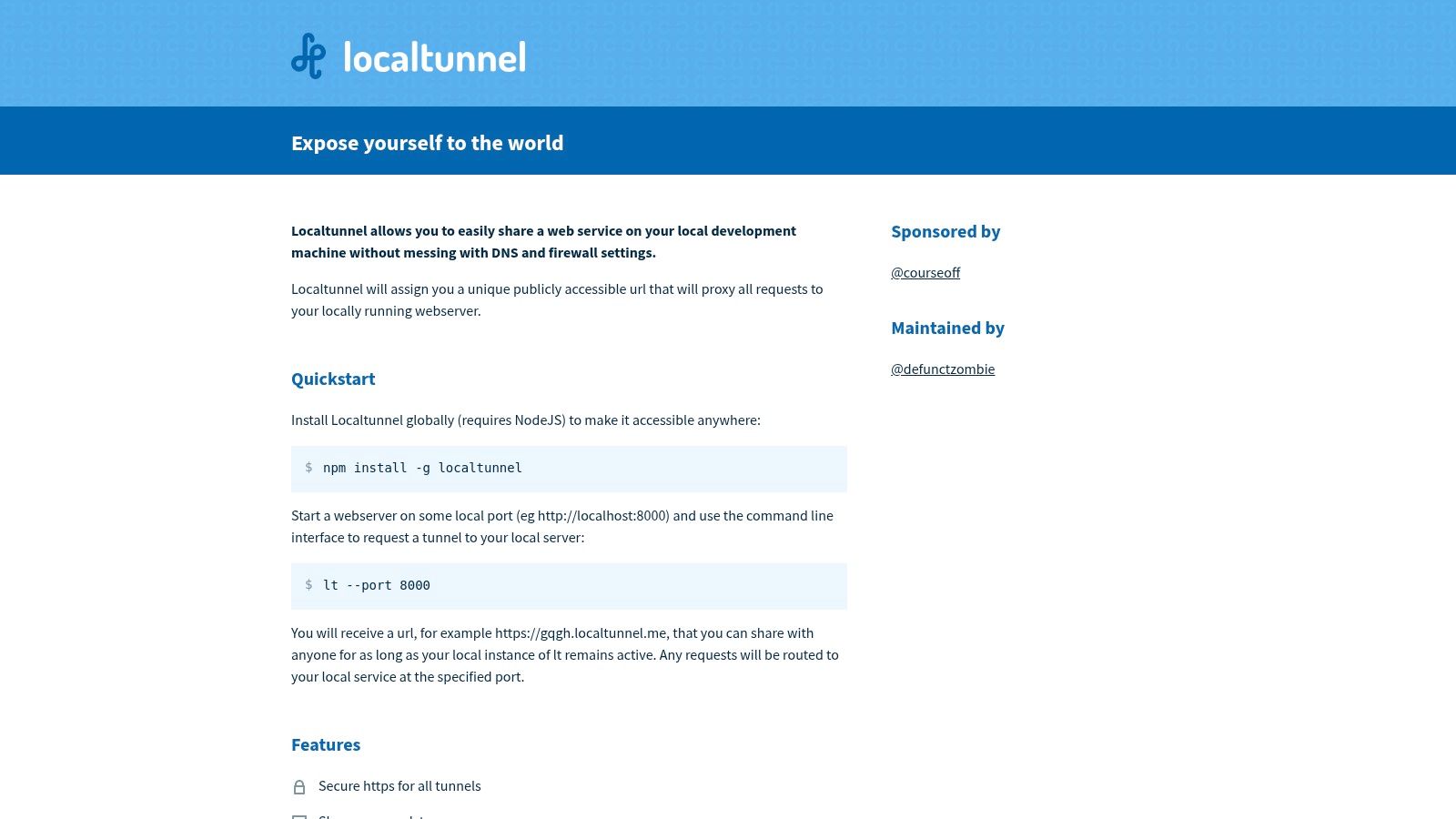
Its simplicity is its strength. A simple command-line interface gets you up and running in seconds. This ease of use is particularly helpful for those new to tunneling tools, or for developers working in restricted networks who need quick access to their local projects. For those working with Laravel and Node.js in a WSL 2 environment, Learn more about Localtunnel and how it can simplify your workflow.
Pros:
Free and open-source
Easy installation and setup
Great for quick testing and demos
Cons:
Limited features compared to ngrok or other paid alternatives
Reliability can be an issue for long-term use. Not recommended for production environments
Doesn't support TCP or UDP tunnels, limiting its use to HTTP/HTTPS
While Localtunnel excels in its simplicity, it's crucial to be aware of its limitations. It's not built for production environments and lacks features found in more robust tools. If your project demands high reliability or complex tunneling configurations, you might need to explore other options. However, for quick testing and sharing, Localtunnel remains a powerful free alternative to ngrok.
2. Serveo
Serveo provides a unique approach to tunneling by leveraging SSH. This makes it a practical alternative to ngrok for developers already comfortable with SSH and working in SSH-compatible environments. It allows you to expose your local server to the internet without any additional software installation, simplifying the setup process considerably. This is particularly useful for quickly sharing your work or testing webhooks without complex configurations.
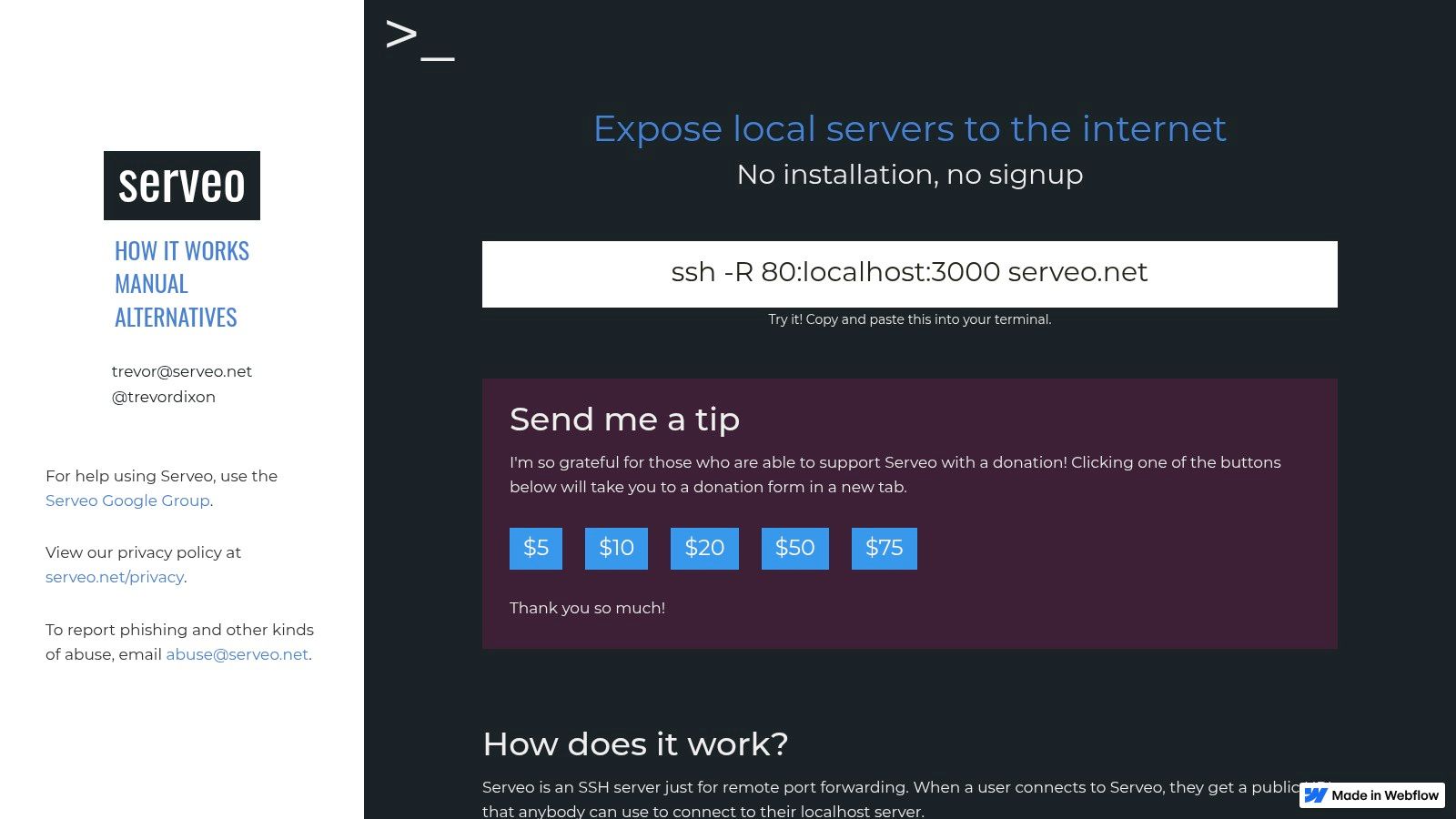
Its core strength lies in its simplicity. A single SSH command establishes the tunnel, making it incredibly quick to get started. This no-fuss approach can be a lifesaver when you need to share your local project instantly. Serveo supports both HTTP/HTTPS and TCP protocols, offering flexibility for different development needs. While it doesn't offer the extensive features of ngrok, its reliance on SSH provides inherent security.
Pros:
Quick setup with a single SSH command
No software installation required
Secure connections through SSH encryption
Cons:
Limited to SSH-compatible environments
Lacks built-in authentication mechanisms
Potential latency depending on server load
While Serveo shines in its simplicity and speed, it's important to consider its limitations. The dependence on SSH can be a constraint for some environments. The lack of built-in authentication might require extra steps to secure your exposed services. If your project demands advanced features or robust reliability, exploring other ngrok alternatives might be necessary. However, for quick and secure sharing in SSH-friendly environments, Serveo remains a viable option.
3. Pagekite
Pagekite is a versatile tunneling service that supports HTTP, HTTPS, and SSH protocols. Designed for both personal and professional use, it offers persistent URLs and custom domains, making it a solid alternative to ngrok. This makes it particularly useful for developers who need a reliable and consistent way to access their local development environments. If you're working on projects that require secure tunneling or need to expose a local server for testing and collaboration, Pagekite is worth considering.
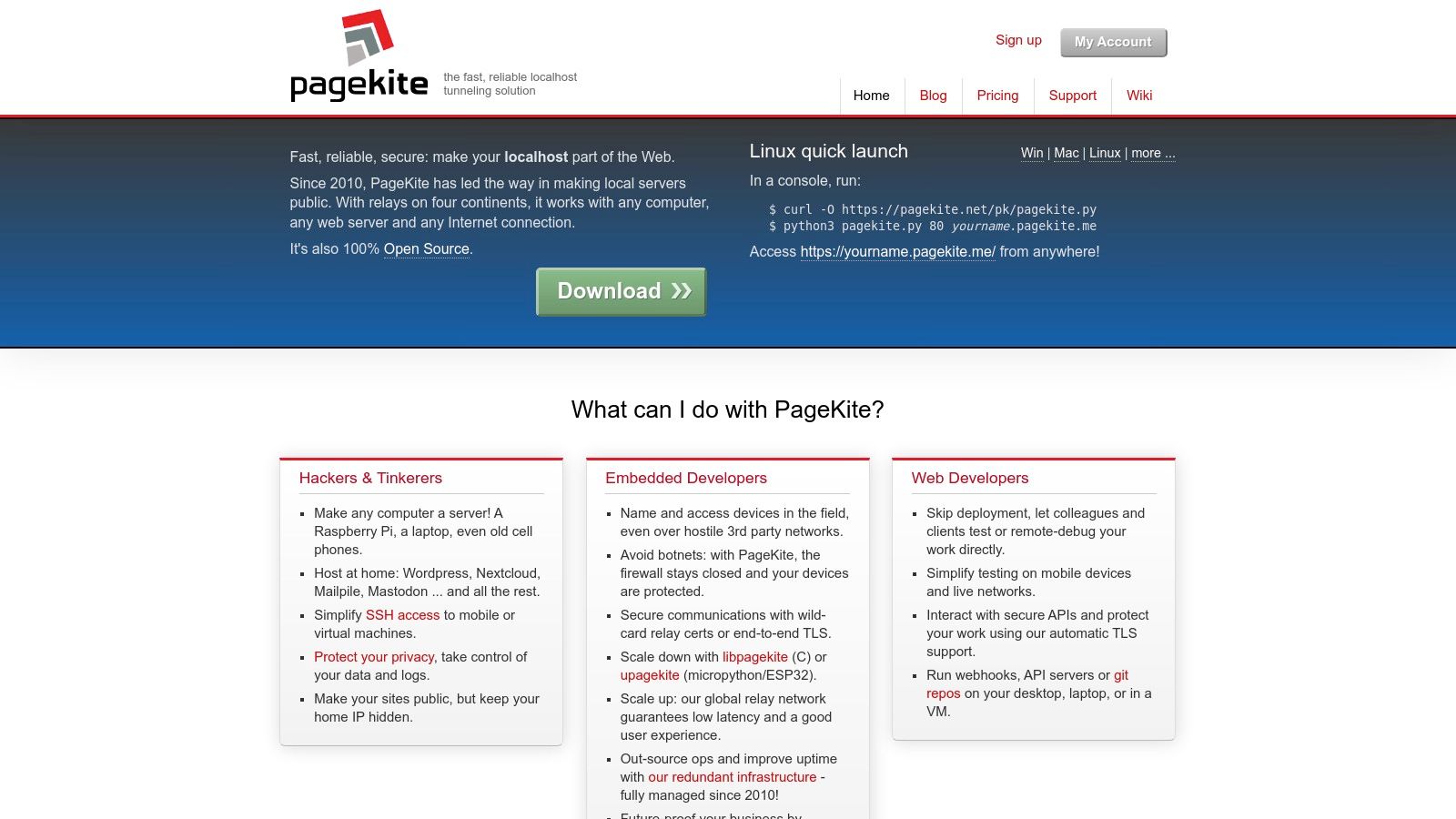
Its support for multiple protocols makes it flexible for various development needs. The persistent URLs provide a consistent access point, unlike some free alternatives that generate random URLs each time. The open-source client allows for customization and deeper integration into your workflow. For freelance developers working on client projects or those needing reliable access from different locations, Pagekite offers a stable solution.
Pros:
Supports a wide range of protocols (HTTP, HTTPS, SSH)
Persistent URLs enhance reliability
Open-source client allows for customization
Cons:
Free tier has limited bandwidth (2GB per month)
Requires account setup for custom domains
Not as user-friendly as some alternatives
While Pagekite's free tier has bandwidth limitations, its paid plans offer more generous allowances. Setting up custom domains requires an account, adding a slight layer of complexity. While not as simple as some other tools, the added features and reliability make Pagekite a valuable alternative to ngrok, especially for long-term projects or professional use cases.
4. Cloudflare Tunnel
Cloudflare Tunnel offers a secure alternative to ngrok, allowing you to share your local development server without opening any firewall ports. It routes traffic through Cloudflare's global network, providing built-in security and performance benefits. This is particularly appealing for developers concerned about exposing their local IP addresses or needing robust protection against DDoS attacks. If you're already using Cloudflare for your domain, integrating Cloudflare Tunnel streamlines your workflow.
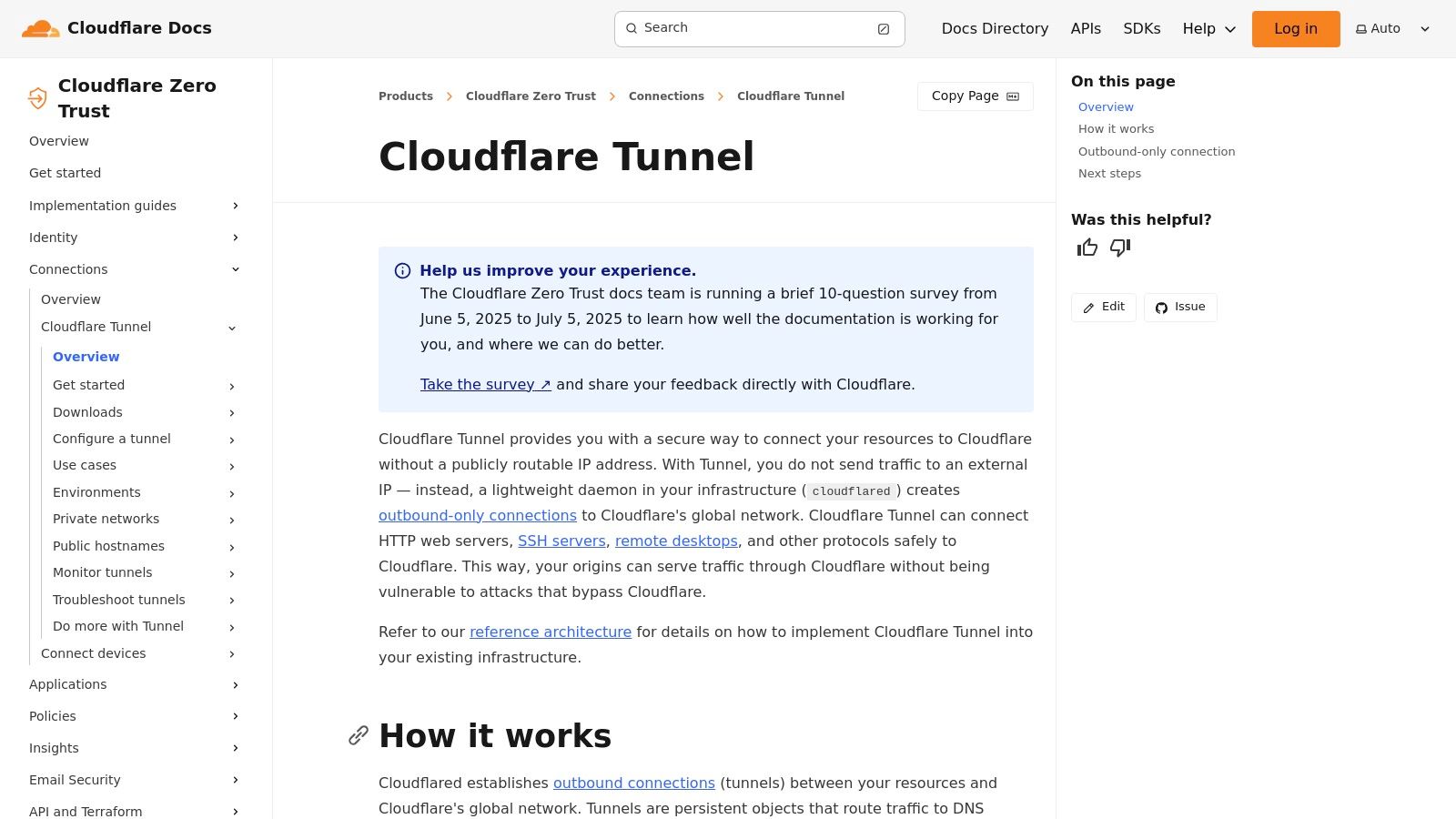
Its integration with Cloudflare's ecosystem is a significant advantage. You gain access to features like their CDN, WAF, and DDoS protection, which enhances both security and performance. While a free tier is available, Learn more about Cloudflare Tunnel and how it compares with other tools that provide static domains. This makes it a compelling option for developers seeking a robust, integrated solution.
Pros:
Enhanced security through Cloudflare's infrastructure
No firewall modifications needed
Free tier with generous features
Cons:
Requires a Cloudflare account and domain
Initial setup can be complex
Limited to HTTP/HTTPS protocols
While Cloudflare Tunnel offers significant advantages in security and performance, it's important to consider the initial setup complexity. It's not as plug-and-play as ngrok, and requires familiarity with Cloudflare's platform. However, if security and integration with Cloudflare's services are paramount, Cloudflare Tunnel stands out as a strong ngrok alternative.
5. Tailscale
Tailscale is a zero-configuration VPN and an alternative to ngrok, ideal for creating a secure mesh network between your devices. This allows private access to local services without exposing them to the public internet. It’s particularly useful for accessing development servers from other devices or collaborating on projects within a secure network. Tailscale offers secure network access, similarly to other cloud computing solutions. You might find more information about it in this article about Cloud Computing.
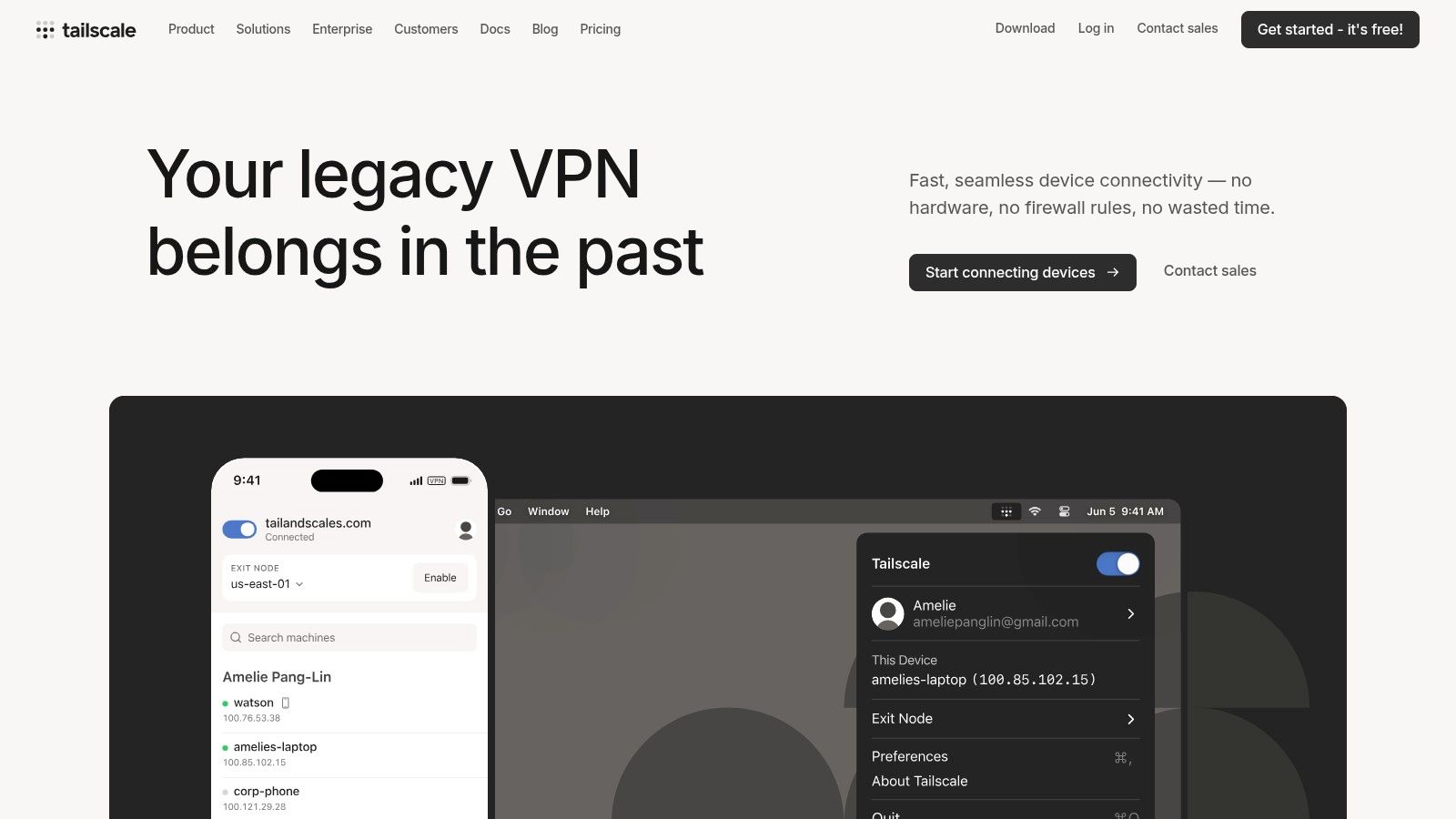
Its ease of setup and cross-platform compatibility makes it a compelling alternative to traditional VPNs. Learn more about Tailscale and VPN servers With Tailscale, you can quickly establish secure connections between devices regardless of their location. This is particularly beneficial for developers working remotely or those needing to access resources within restricted networks.
Pros:
High security with WireGuard-based encryption
Easy setup and management
Cross-platform support
Cons:
Not designed for public internet exposure
Free tier limitations
Potential complexity for advanced network setups
While Tailscale excels in secure network access, it isn't a direct replacement for ngrok. Its focus is on private networking rather than public access to local services. If your primary need is to expose a local development server to the internet, ngrok or other similar tools might be better suited. However, for secure device connectivity and private network access, Tailscale is a powerful alternative.
6. Localtonet
Localtonet is a versatile tunneling service that provides a secure pathway for exposing your local servers to the internet. Supporting HTTP, HTTPS, TCP, and UDP protocols, it offers a robust solution for various development and testing needs. Its features like custom subdomains, password protection, and usage analytics make it a compelling alternative to ngrok, especially for developers seeking more control over their tunnels. This tool proves beneficial when testing webhooks, game servers, or applications relying on UDP.
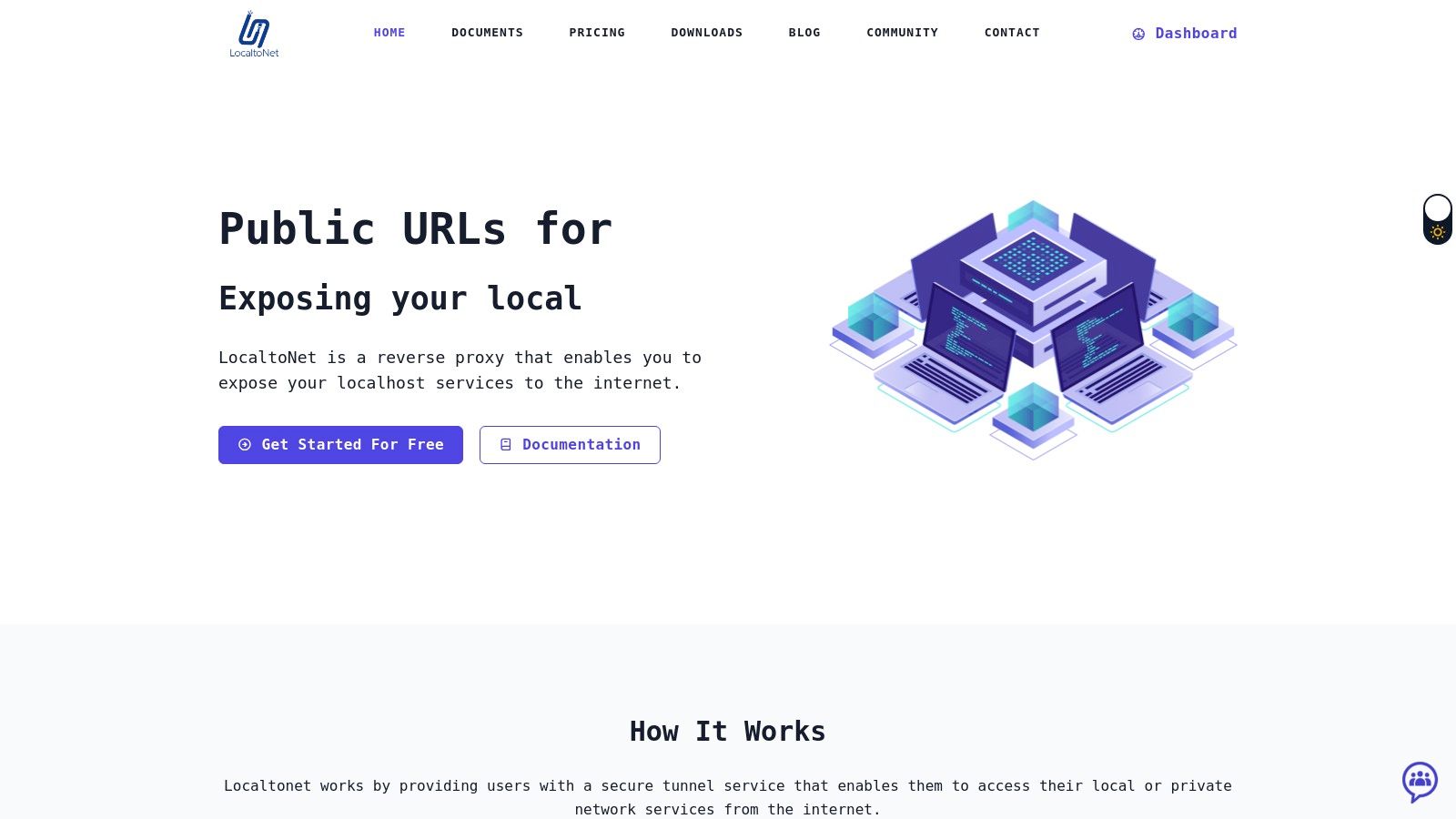
Localtonet's user-friendly interface and detailed documentation make setup straightforward, even for beginners. The platform caters to both quick testing and more complex scenarios. Its affordability, coupled with the ability to manage multiple tunnels, makes it an attractive option for freelance developers and small teams. Developers working with protocols beyond HTTP/HTTPS, such as those building real-time applications or game servers, will find Localtonet's support for TCP and UDP particularly useful.
Pros:
Versatile protocol support (HTTP, HTTPS, TCP, UDP)
User-friendly interface with clear documentation
Affordable pricing plans for extended features
Cons:
Limited features in the free tier
Requires client software installation
Smaller community support compared to more established platforms
Localtonet strikes a balance between ease of use and advanced features. While the free tier has some limitations, the paid plans offer excellent value. Its versatility in protocol support makes it a strong alternative to ngrok, particularly when working with UDP or TCP. However, the requirement for client software might be a minor drawback for some users. If your project demands broader protocol support and detailed tunnel management, Localtonet is worth considering.
7. Pinggy
Pinggy offers a unique approach to local development tunneling as a software-free alternative to ngrok. It leverages SSH to expose your local servers to the internet, supporting HTTP, TCP, and UDP tunnels. This makes it versatile for various development scenarios, including webhooks, game development, and IoT applications. Freelance developers working with clients on projects requiring different protocols will find this flexibility particularly valuable.
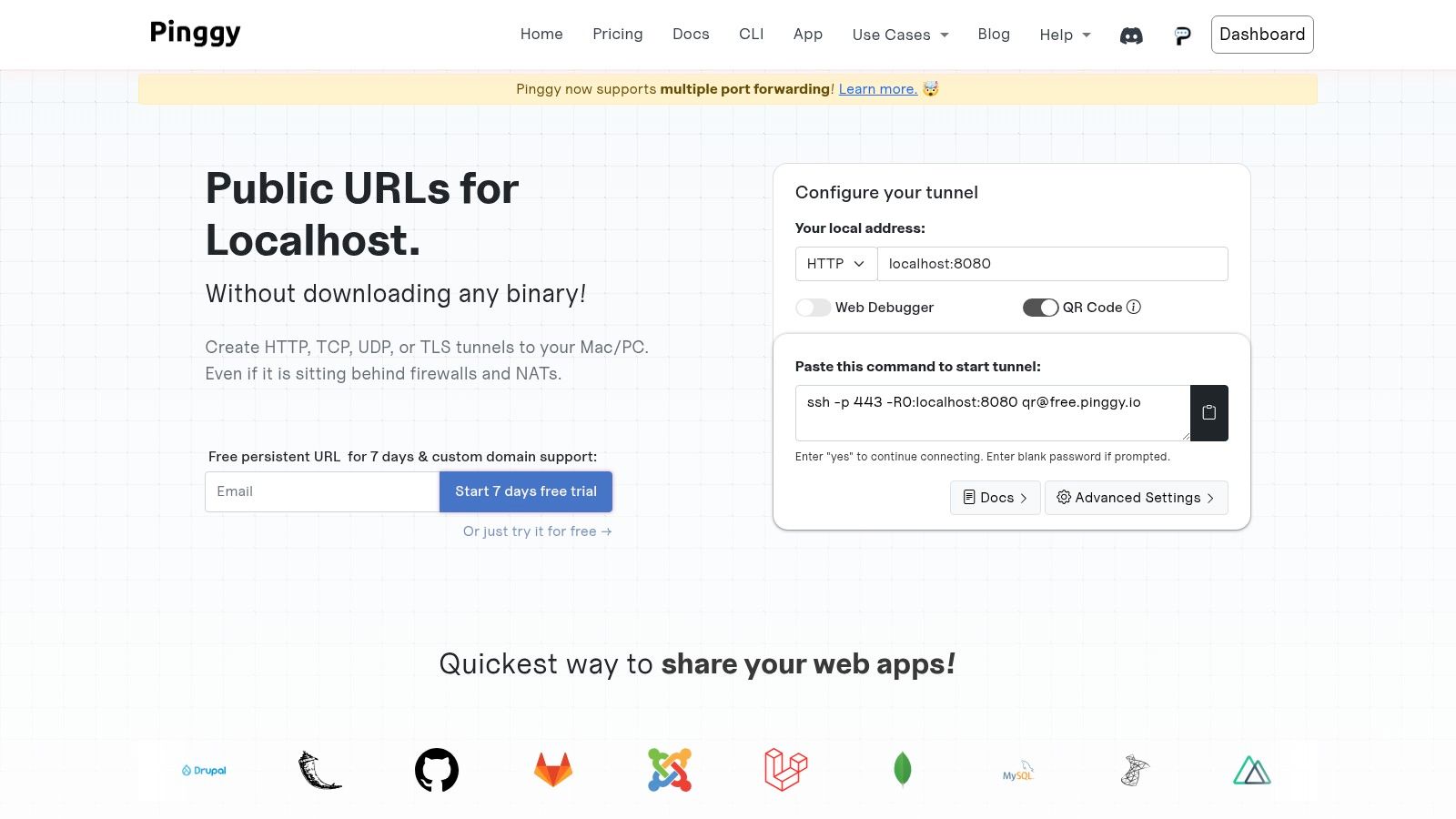
Setting up Pinggy is remarkably simple; a single SSH command gets your tunnel running. The ability to use custom domains and subdomains adds a professional touch when showcasing work or integrating with third-party services. Pinggy also provides traffic monitoring and debugging tools, which can be invaluable during development and testing. For developers frequently working in restricted networks, Pinggy's reliance on SSH can be a significant advantage.
Pros:
Quick setup via SSH
Supports HTTP, TCP, and UDP
Affordable pricing
Custom domains
Cons:
No OAuth 2.0 authentication for tunnel visitors
No global server load balancing
Limited community support
While Pinggy's SSH-based approach offers unique advantages, it's essential to consider its limitations. The lack of OAuth 2.0 support might be a concern for certain security-sensitive applications. If your project requires extensive load balancing or relies on robust community support, exploring other alternatives may be advisable. However, Pinggy remains a powerful and convenient option for many developers seeking a quick and affordable alternative to ngrok, especially for those comfortable working with SSH.
8. frp (Fast Reverse Proxy)
frp is a high-performance reverse proxy application. It supports multiple protocols and is designed for speed and efficiency. It lets you expose local servers to the internet, making it a viable alternative to ngrok, particularly for scenarios requiring more control and customization. This makes it especially appealing to developers working with complex network setups or needing to bypass firewalls.
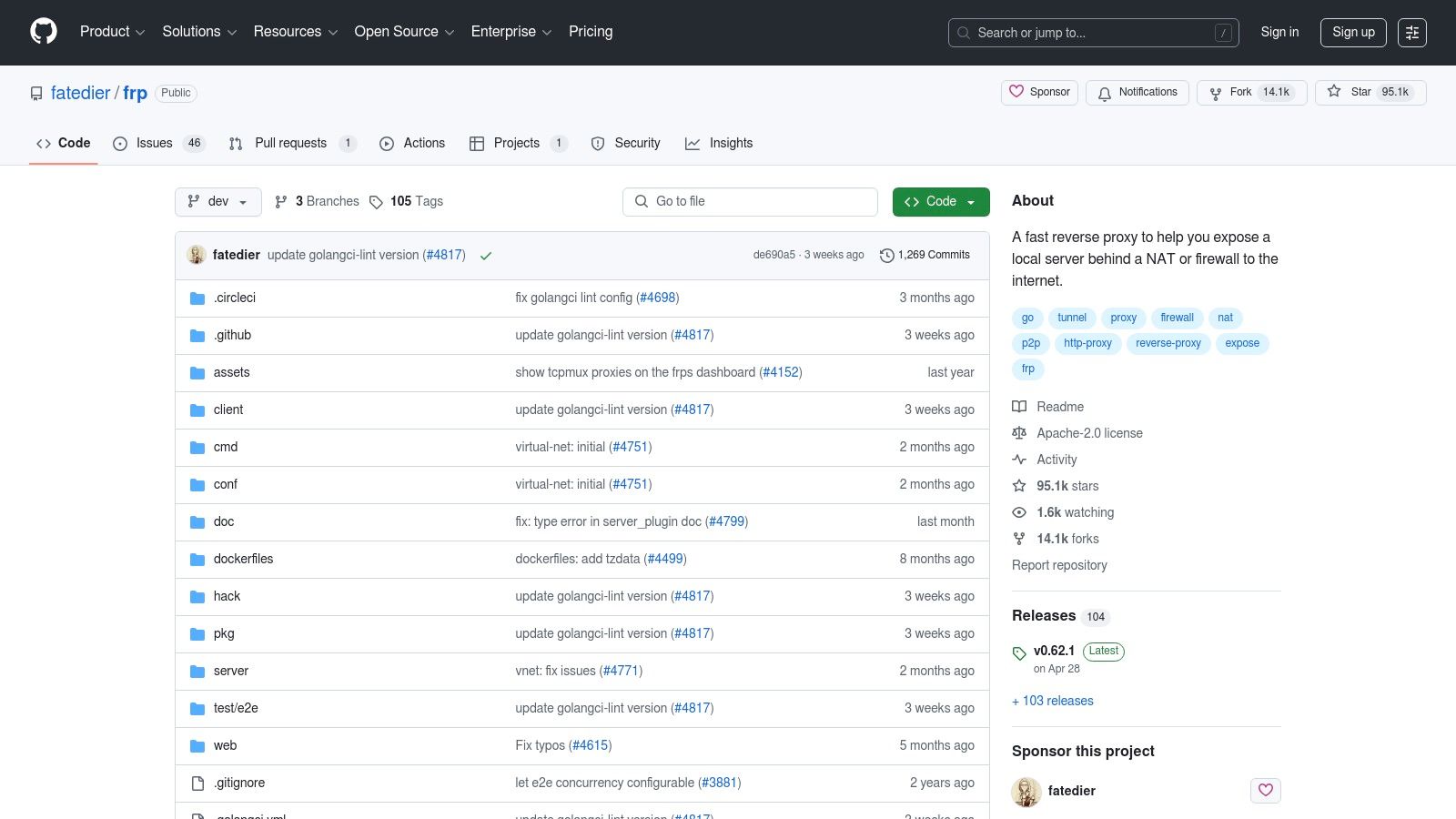
Its strength lies in its flexibility. You can configure frp to handle TCP, UDP, HTTP, and HTTPS traffic. This versatility makes it suitable for a wider range of applications than simpler tunneling tools. Its custom subdomains and domain support, alongside encryption and compression, add further layers of control and security. The active community and regular updates ensure ongoing support and improvements. For those comfortable with server management, frp offers granular control over your tunneling setup.
Pros:
Highly customizable and feature-rich
Supports a wide range of protocols (TCP, UDP, HTTP, HTTPS)
Active community and regular updates
Cons:
Requires self-hosting and server management
Initial setup can be complex for beginners
Limited official documentation
While frp's extensive features are a significant advantage, the initial setup can be challenging. It requires a server to run the frp server component. This self-hosting aspect adds complexity compared to ngrok's out-of-the-box solution. If you're comfortable managing servers and need the flexibility frp offers, it's a powerful alternative to ngrok. However, if ease of use is a priority, simpler solutions might be a better fit. You can find frp on GitHub.
9. Loophole
Loophole is a tunneling service offering secure, shareable URLs for local web servers. With end-to-end encryption, it's designed for developers prioritizing privacy and security. This makes it a strong alternative to ngrok for those concerned about data protection during testing and development. Loophole is particularly useful when dealing with sensitive data or working in environments with strict security requirements.
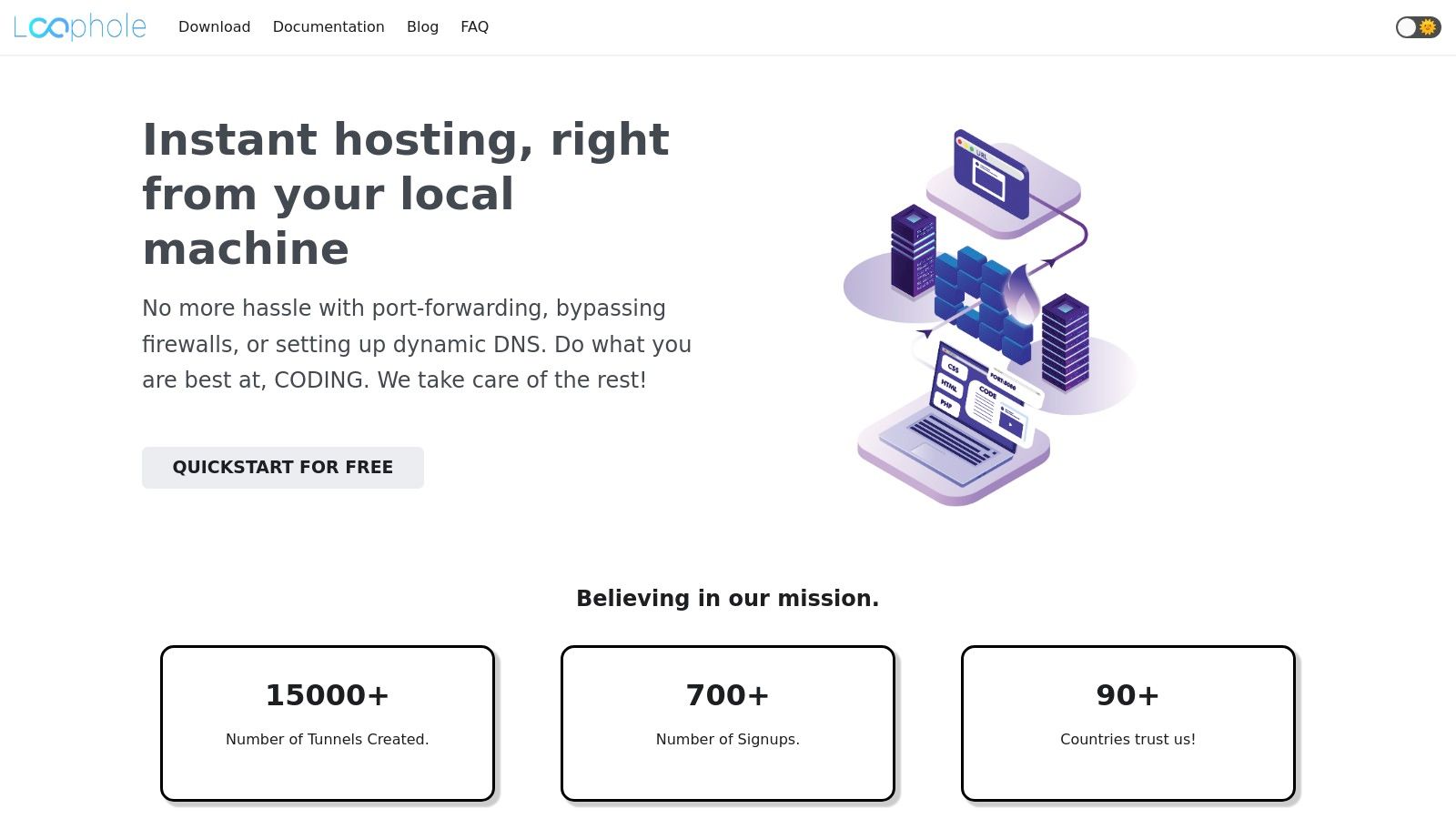
Its key strength lies in its simplicity and security focus. A single command initiates the tunnel, and automatic HTTPS with Let's Encrypt ensures secure connections. This ease of use, combined with strong security features, makes it a valuable tool for developers. Loophole simplifies sharing local projects, testing webhooks, or integrating with services like social media APIs without exposing sensitive data.
Pros:
Focus on security and privacy
Easy to use with minimal setup
Free to use
Cons:
Limited features compared to other services
No support for TCP or UDP tunnels
Limited community support
While Loophole shines in its simplicity and security, it's important to acknowledge its limitations. The feature set is currently smaller than some alternatives, and it lacks TCP/UDP tunnel support. However, if your priority is secure and easy HTTP/HTTPS tunneling, Loophole is a solid free alternative to ngrok. It provides a good balance between ease of use and security for developers working with sensitive data.
10. Zrok
Zrok stands out as an open-source alternative to ngrok built upon the OpenZiti network. It's designed for secure, private sharing of local files and applications without exposing them directly to the public internet. This zero-trust approach makes Zrok particularly appealing for developers concerned about security and data privacy. It's a good fit for sharing sensitive projects or working within restricted network environments.
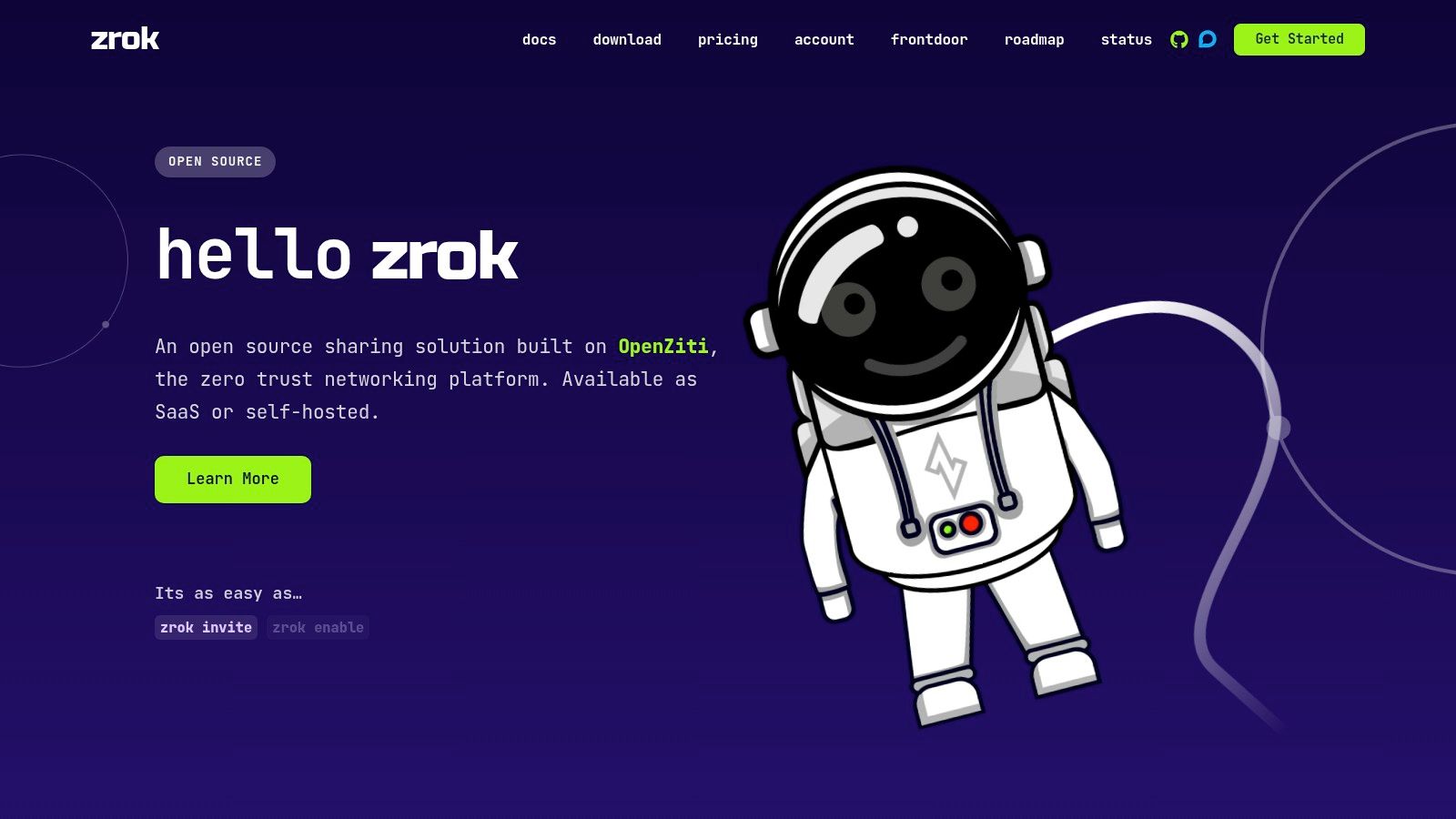
Because Zrok is self-hosted, you have complete control over your data and server configurations. This offers significant advantages in terms of security and customization. The peer-to-peer file sharing capability further enhances privacy, making it a viable option for collaborative projects where direct file transfers are needed. Zrok's focus on zero-trust networking aligns well with modern security best practices.
Pros:
High security due to zero-trust principles
Full control with self-hosting
Private sharing without public internet exposure
Cons:
Requires self-hosting and server management
Initial setup can be complex
Limited community support compared to more established tools
While Zrok provides a robust and secure alternative to ngrok, the self-hosting requirement adds complexity. It's not as plug-and-play as some other options. If you're comfortable managing your own server and prioritize security, Zrok is worth exploring. However, for simpler use cases, a less complex alternative might be a better fit. For more information and documentation, visit the Zrok website.
11. Packetriot
Packetriot is a managed tunneling service offering a robust alternative to ngrok, particularly for developers who need support beyond HTTP/HTTPS. It supports various protocols, including TCP and UDP, making it suitable for a wider range of applications like game development or IoT device testing. Its custom domain and SSL/TLS encryption features provide added security and professionalism when sharing your local projects. A user-friendly web dashboard makes managing your tunnels straightforward.
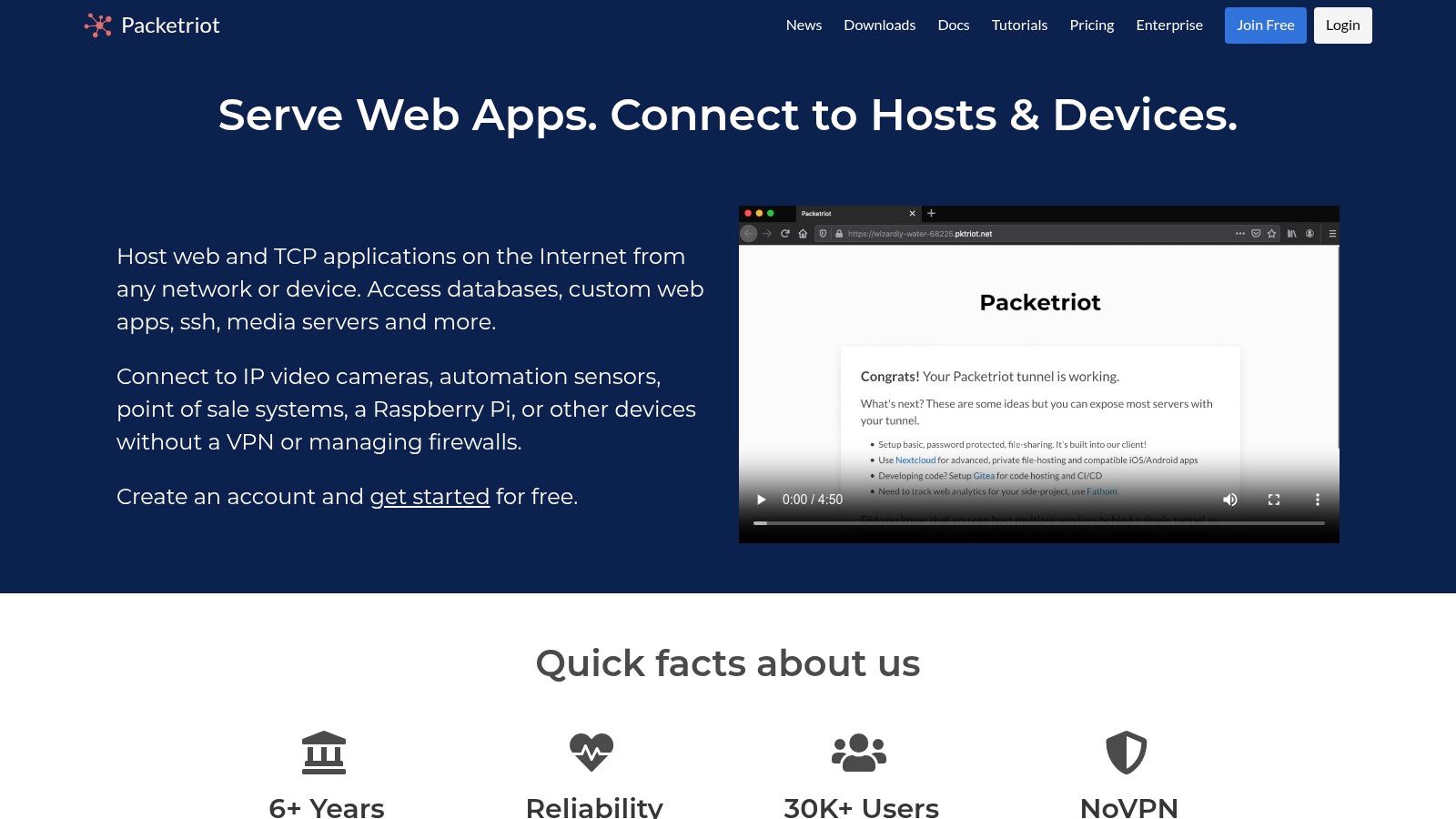
Its versatile protocol support is a key differentiator. While many free alternatives focus solely on HTTP/HTTPS, Packetriot's inclusion of TCP and UDP opens doors for more complex projects. The web-based dashboard further simplifies tunnel management, offering a centralized location to control and monitor your connections. This is particularly helpful for developers juggling multiple projects or requiring quick access to tunnel configurations.
Pros:
Versatile protocol support (HTTP, HTTPS, TCP, UDP)
User-friendly web interface for tunnel management
Affordable pricing plans for extended features
Cons:
Free tier has limited features
Requires installation of client software
Limited community support compared to more established tools
While Packetriot offers a compelling feature set, it's important to consider its limitations. The free tier's restrictions might push users towards paid plans for full functionality. The need for client software installation adds a slight complexity compared to browser-based solutions. If your projects require extensive community support, exploring other options might be beneficial. However, for developers seeking versatile protocol support and a streamlined management experience, Packetriot presents a solid alternative to ngrok.
12. Inlets
Inlets is a cloud-native tunneling tool offering a secure way to expose your local services to the internet. It's also designed for connecting services across different networks. This makes it a powerful alternative to ngrok, especially for more complex setups beyond simple local development sharing. If you're working with microservices or need to bridge networks, Inlets offers a robust solution.
Inlets stands out with its focus on secure tunnels and cross-network connections. This makes it suitable for scenarios where security and network segmentation are paramount. Think securely accessing a development server behind a firewall or connecting services in different cloud environments. It's a step up from simple tunneling for local demos and caters to more advanced networking needs.
Pros:
Cloud-native design for flexible deployment
Strong focus on secure tunneling
Excellent for connecting services across networks
Cons:
Requires more technical setup compared to simpler alternatives
Steeper learning curve for beginners
Pricing can vary depending on your cloud provider and usage
While Inlets offers powerful features for complex scenarios, it's essential to consider the learning curve and potential costs. It's not the simplest tool for quick sharing but shines when security and inter-network connections are critical. If your needs go beyond basic local tunneling, Inlets provides a robust alternative to ngrok for professional use cases.
Key Features Comparison of 12 Ngrok Alternatives
| Tool | Core Features & Protocols | User Experience & Security | Value & Pricing | Target Audience | Unique Selling Points |
| Localtunnel | HTTP/HTTPS, simple CLI | ★★★★ Easy, no auth | 💰 Free, minimal features | 👥 Developers needing quick tests | ✨ Super simple setup |
| Serveo | SSH tunnels, HTTP/HTTPS & TCP | ★★★ Secure (SSH), no install | 💰 Free | 👥 SSH users & quick exposure | ✨ Zero install, SSH-based |
| Pagekite | HTTP, HTTPS, SSH, persistent URLs | ★★★ Wide protocol, open-source | 💰 Free tier (2GB/month) | 👥 Personal & pro users | ✨ Persistent URLs, open-source |
| Cloudflare Tunnel | HTTP/HTTPS, Cloudflare CDN & security | ★★★★★ Secure, DDoS protection | 💰 Free tier | 👥 Users needing enterprise security | 🏆 Integrated Cloudflare security |
| Tailscale | VPN mesh, WireGuard encryption | ★★★★★ High security, multi-platform | 💰 Free personal, paid teams | 👥 Teams & personal VPN users | ✨ Zero-config private mesh VPN |
| Localtonet | HTTP, HTTPS, TCP, UDP, password protection | ★★★ Versatile protocols, analytics | 💰 Affordable plans | 👥 Developers needing UDP & monitoring | ✨ Multi-protocol + monitoring |
| Pinggy | SSH-based, HTTP, TCP, UDP | ★★★ Quick SSH setup | 💰 Affordable | 👥 SSH users & multi-protocol support | ✨ Traffic monitoring |
| frp | TCP, UDP, HTTP(S), encryption, load balancing | ★★★★ Highly customizable | 💰 Self-hosted (free) | 👥 Advanced users & self-hosters | ✨ High performance & flexibility |
| Loophole | HTTP/HTTPS, auto HTTPS, end-to-end encryption | ★★★★ Secure, easy | 💰 Free | 👥 Privacy-focused developers | ✨ E2E encryption, no install |
| Zrok | Zero-trust networking, P2P file sharing | ★★★★ Secure, self-hosted | 💰 Free (self-hosted) | 👥 Security purists, file sharers | ✨ Zero-trust, private sharing |
| Packetriot | HTTP, HTTPS, TCP, UDP, SSL, web dashboard | ★★★ User-friendly web UI | 💰 Affordable plans | 👥 Developers wanting dashboard | ✨ Web UI + protocol versatility |
| Inlets | Cloud-native secure tunneling | ★★★ Secure service exposure | 💰 Varies (no data) | 👥 DevOps & secure service connectors | ✨ Cloud-native secure tunnels |
Choosing the Right ngrok Alternative for Your Needs
Finding the perfect alternative to ngrok hinges on your individual needs. Are you quickly testing a web application? Do you need a solution for secure production deployments? Or perhaps you need access to a private network? This guide has explored twelve powerful ngrok alternatives, each with its own strengths and weaknesses. By carefully considering the features, pricing structures, pros, and cons, and aligning them with your specific use cases, you can confidently choose the right tool for the job.
Key Takeaways and Considerations
Let's recap some of the most crucial factors to keep in mind:
Simplicity vs. Control: Tools like Serveo offer unparalleled simplicity, ideal for quick tests. However, for more granular control and advanced features, consider options like frp or Cloudflare Tunnel.
Security: Security is paramount. When exposing local servers, understand the security implications. Tools like Inlets offer a secure way to expose your local services; you can read more about the future of network security in digital workspaces here: The Future Of Network Security In Digital Workspaces. Evaluate each tool's security measures before deployment, particularly in production environments.
Pricing: From free and open-source solutions like Localtunnel to paid services like Pagekite and Cloudflare Tunnel, choose a pricing model that aligns with your budget and usage patterns.
Ease of Use: For beginners or quick setups, user-friendly tools like Localtonet and Pinggy are excellent choices. If you're comfortable with command-line interfaces and configuration files, more powerful tools like frp offer greater flexibility.
Operating System Compatibility: Ensure the chosen tool supports your operating system, whether it's Windows, macOS, or Linux. Consider compatibility with WSL 2 if you're working in a mixed environment.
Making the Right Decision
Choosing the right alternative to ngrok doesn't have to be daunting. Start by clearly defining your requirements. List your must-have features and consider factors like security, ease of use, and budget. Then, revisit the detailed analysis of each tool in this guide and compare them against your specific needs.
Consider these scenarios:
Freelancers on Upwork: For showcasing projects to clients, Serveo or Localtunnel might suffice.
Web Developers (Laravel/Node.js): For debugging and collaboration, consider frp or Localtonet.
Software Engineers (API Integrations): Secure tunneling solutions like Cloudflare Tunnel or Tailscale are ideal for working with sensitive APIs.
Next Steps
We've equipped you with the knowledge to choose the right ngrok alternative. Now, take action! Experiment with a few tools that piqued your interest. Test them with your own projects. Experience their strengths and weaknesses firsthand. This practical approach will give you the confidence to integrate the chosen tool seamlessly into your development workflow.
For more in-depth tutorials, practical guides, and insights on these tools and other related web development topics, explore Sohaib Ilyas. Sohaib frequently shares valuable resources to help developers improve their workflow, including best practices for utilizing ngrok alternatives and enhancing development processes. Start exploring and elevate your development journey today.
Subscribe to my newsletter
Read articles from Sohaib Ilyas directly inside your inbox. Subscribe to the newsletter, and don't miss out.
Written by
